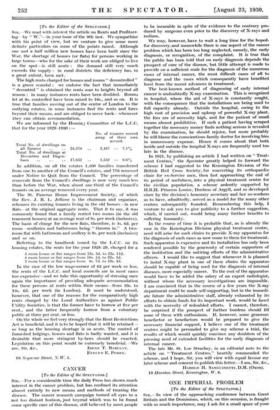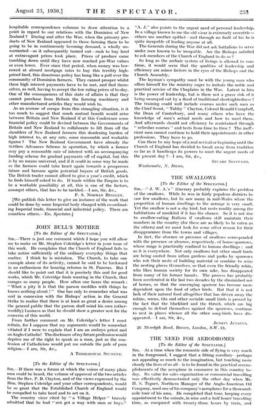ONE IMPERIAL PROBLEM [To the Editor of the SPECTATOR.]
Sin,—In view of the approaching conference between Great Britain and the Dominions, which, on this occasion, is fraught with so much importance; may I ask for a small space of your hospitable correspondence columns to draw attention to a point in regard to our relations with the Dominion of New Zealand ? During and after the War, when the primary pro- ducts of New Zealand appeared to those farming there to be going to be in continuously booming demand, a wholly un- wananted—as it subsequently turned out—rush to buy land at extravagant prices took place. Prices of produce came tumbling down until they have now reached pre-War values or even lower. Ever since that period, when money was bor- rowed at absurd mortgage rates to buy this terribly high- priced land, this disastrous policy has hung like a pall over the community of Dominion farmers. They cannot prosper whilst these high interest payments have to be met, and find them- selves, as well, having to accept the low ruling prices of to-day. One of the-consequences of this state of affairs is that they cannot purchase from Britain the farming machinery and other manufactured articles they would wish to.
As an avenue of escape from this strangling situation, is it too much to suggest that much mutual benefit would arise between Britain and New Zealand if at this Conference sonic financial policy could be devised between the Governments of Britain and New Zealand to collaborate to lift from off the shoulders of New Zealand farmers this deadening burden of high interest to, at any rate, some reasonable and workable figures ? The New Zealand Government have already the Settlers Advances Scheme in operation, by which a farmer may pay a reasonable rate of interest with an accompanying funding scheme for gradual payments off of capital, but this is by no means universal, and if it could in some way be made so the farmers could take heart again towards a prosperous future and become again potential buyers of British goods. The British trader cannot afford to give a year's credit, which he finds himself asked to do. If trade within the Empire is to be a workable possibility at all, this is one of the factors, amongst others, that has to be tackled.—I am, Sir, &c.,
F. S. NORMAN RINGLET.
[We publish this letter to give an instance of the work that could be done by some Imperial body charged with co-ordinat- ing Imperial trade, financial and industrial policy. There are countless others.—En. Spectator.]

































 Previous page
Previous page